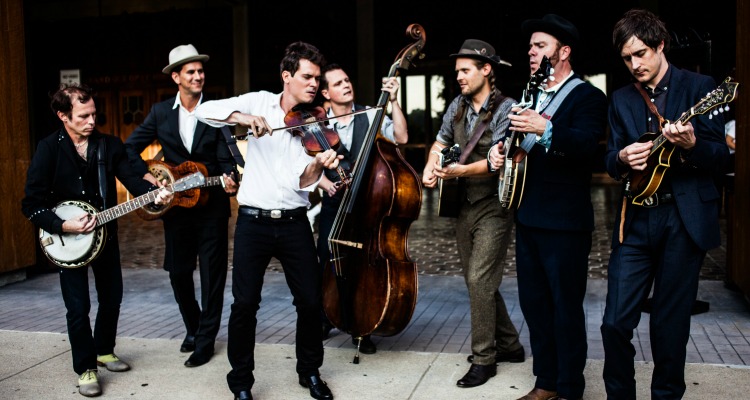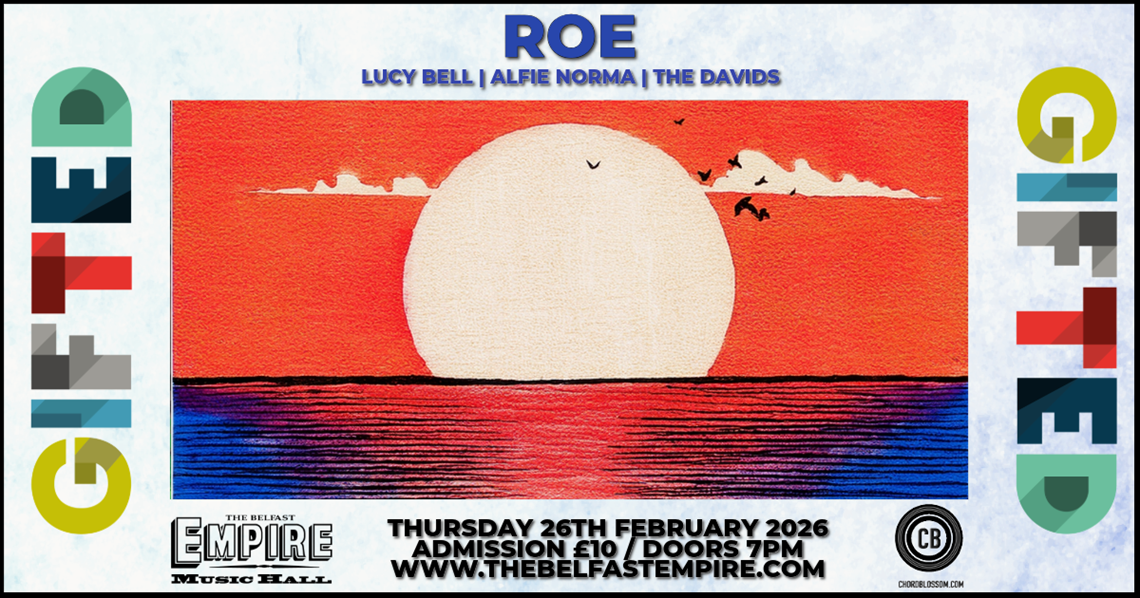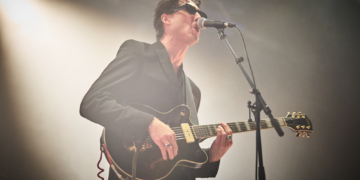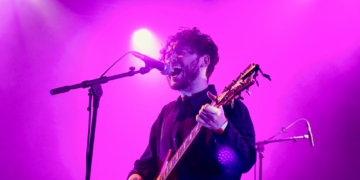Old Crow Medicine Show with support from Parker Millsap
Tuesday 21st October 2014 – Mandela Hall, Belfast
For three hours on a drearily wet Belfast night, a little piece of Nashville sunshine shone upon a rain-soaked Mandela Hall audience, willingly brought by bluegrass troubadours Old Crow Medicine Show. Led from the front by the wild and unhinged Ketch Secor, the seven-piece drawled over ballads, stomped through the boogie-woogie, and raced through their famed brand of old-time hillbilly hoedowns.
Credit for the audience’s satisfaction must also be shared, not equally, but considerably with opening act Parker Millsap and his two-piece (Michael Rose, Daniel Foulks) accompaniment. His performance of ‘Truck Stop Gospel’ was a particular cause for amusement with the spits and mumbles of his delivery and restless feet being a throw back to ‘All Shook Up’ era Elvis. With the backing of just a double bass and fiddle, Millsap was a perfect musical precursor to the headliners. It also helped that his songwriting was up to the occasion. Midway through ‘Quite Contrary’ a song bringing children’s storybook characters into the realms of current day cynicism, I overheard a nearby audience member mouth to another, ‘That’s a hell of a song.’ An endorsement that I’m sure was echoed throughout the rest of the crowd.
His offer to sign LP’s at the front of the venue was sure to be taken up by many as the three piece humbly left to a swell of appreciation. This left it open for the prize horse to enter the barn, and with Old Crow Medicine Show branded in its hide, it didn’t take long for it to break down the door.
Opening with a salvo including ‘Alabama High-Test’ and new track ‘Firewater,’ the crowd was instantly enamoured with the main attraction. Whilst these songs were dependent on an against-bluegrass-tradition drumbeat, it took drummer Cory Younts’ departure from the kit to centre stage for the night to really lift off. During ‘8 Dogs, 8 Banjos,’ after ditching his mandolin, Younts broke into an Ireland-only hybrid of barn dancing and an Irish Jig. Needless to say the crowd went wild to this display of showmanship. This was the perfect foil to bandleader Ketch Secor who for the whole night was generally attracting the majority of audience attention.
I say bandleader in this instance as, to simply define him as the fiddle player/ lead vocalist, is to belittle the range of instruments he sets on fire throughout the night. Certainly most commendable on fiddle, Secor also delves into harmonica, banjo, acoustic guitar, and mandolin all whilst leading some of the tightest vocal harmonies that you’ll hear outside of a Gospel choir.
The whole band is capable of singing solo, whether it’s Kevin Hayes taking the lead on ‘Humdinger’ or co-founder Critter Fuqua taking on the duty for roughly a quarter of the set, the whole band, with the exception of Morgan Jahnig, is capable of carrying a song. Jahnig’s double bass is the only constant throughout the night and whilst the rest have moments to take the spotlight, Jahnig’s job is vital. His juggernaut thuds of the bass give the band it’s backbone in place of the oft-absent drums.
On the topic of unsung heroes, praise is also deserved for the soundmen and roadies and their ability to cope with the plethora of instrument changes. Each member seemed to require a change of instrument after every song, with the roadie an ever-present figure on the stage. Deservedly, to one of the biggest cheers of the night, the roadie, interrupting another of Younts’ dance solos, played a brief, but highly competent mandolin solo in this midst of a medley of high-octane bluegrass.
The camaraderie and enjoyment seen on stage between the musicians and crew was certainly contagious as the crowd’s raucous excitement grew steadily with every song. After a series of tracks from the latest album Remedy (‘Sweet Amarillo’) and older cuts (Cumberland River), the band sought to quell the ocean of applause in favour of awed silence.
Setting a 1930’s style tin can microphone at the forefront of the stage, the band huddled round, and hushed the crowd, before belting out a pitch-perfect rendition of Willie Dixon’s ‘Somebody Tell That Woman.’ The crowd reveled in the intimacy; only breaking their reverent silence to screech along with the single beat thrashes of Chance McCoy’s guitar in each chorus. If you can’t see this band live show firsthand, I suggest you YouTube the crowd-shot videos of this cover online. Both showcasing the vocal prowess and live presence of OCMS it also portrays their abilities outside of what they are traditional known for.
What that is, is two things; firstly they are known for the livewire bluegrass they play, like a hybrid between The Clash and a jug band, and secondly, they are in/famous for co-writing what has become the scourge of the mid-Ulster bar band and country scene, ‘Wagon Wheel.’
Of course in the good old days before Nathan Carter was filling the dancehalls of Ireland, ‘Wagon Wheel’ was considered an undiscovered classic. As it is, it seems to be more of a good song tarnished by the myriad of covers that have followed it. But judging by the reception it got in the Mandela, it’s still the reason for a lot of the crowd’s knowledge of the band. In light of that, even if it is now considered sinful to the ears, the song still does its bit to attract a large number of people to the band. For that alone it can be forgiven. It also helps that OCMS play it like it was a folk standard from the days of Woody Guthrie, with Secor delivering the lyric with genuine integrity and passion.
After finishing the salvo of ‘Carry me Back to Virginia’ and the aforementioned ‘Wagon Wheel,’ the band left the stage to raptures of applause and the expectation of an encore. Displaying the ego-less attitude that OCMS have, they returned, with opening act Parker Millsap back to the stage to take lead vocal duties. A soaring take on Van Morrison’s ‘Into The Mystic’ was played, and it was a revelation to hear a classic song played by a classic band.
Praise goes out not just for Millsap’s incredible vocals, but also the decision to cover a song by a local artist that wasn’t ‘Brown Eyed Girl.’ An assumption among US acts seems to be that we enjoy hearing the song, as if it hasn’t already riddled our sub-conscious, so credit to OCMS for deviating from that particular mindset. Tom Petty’s ‘American Girl’ closed the set as a surprising finale, with the dueling fiddles and Fuqua’s twangy delivery giving the crowd a real high to end on. With that the band lined up, shoulder to shoulder, bowed, and left the stage.
Good gigs are supposed to end with an air of disappointment. The crowd’s irritation at the bands failure to return for a second encore was a testament to the OCMS’s effect on the audience. It was a special night for the crowd, but for the Old Crow Medicine Show, it was just another night. A tip for any people new to the band; the albums are good, but the live shows are incomparable. This is a band that knows how to deliver.








